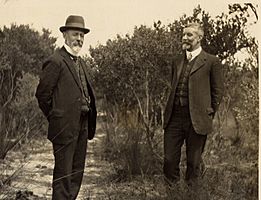Third Deakin ministry facts for kids
Quick facts for kids Third Deakin ministry |
|
|---|---|
7th Ministry of Australia |
|

Joseph Cook and Alfred Deakin in 1909.
|
|
| Date formed | 2 June 1909 |
| Date dissolved | 29 April 1910 |
| People and organisations | |
| Monarch | Edward VII |
| Governor-General | Lord Dudley |
| Prime Minister | Alfred Deakin |
| No. of ministers | 10 |
| Member party | Commonwealth Liberal |
| Status in legislature | Majority government |
| Opposition party | Labour |
| Opposition leader | Andrew Fisher |
| History | |
| Outgoing election | 13 April 1910 |
| Legislature term(s) | 3rd |
| Predecessor | First Fisher ministry |
| Successor | Second Fisher ministry |
The Third Deakin Government was the seventh group of leaders to run the Australian Government. It was led by Alfred Deakin, who was Australia's second Prime Minister. Think of a ministry as the Prime Minister's main team of ministers. These ministers are in charge of different parts of the government, like finance or defence.
This government team, led by Alfred Deakin, started on 2 June 1909. It took over from the previous government, which was led by Andrew Fisher. The change happened because two political parties, the Protectionist Party and the Anti-Socialist Party, joined together. They formed a new, bigger party called the Commonwealth Liberal Party. This new party had enough support to form the first majority government in Australia's history. This means they had more than half the seats in parliament.
The Third Deakin Government lasted for almost a year. It ended on 29 April 1910. This was after a big election on 13 April 1910. In that election, the Labour Party won against the Liberals. After the election, the Labour Party formed the next government.
Joseph Cook, who passed away in 1947, was the last person from this government team who was still alive.
Who Was in the Deakin Government Team?
This government team had ten members, all from the new Commonwealth Liberal Party. They worked together to make decisions for Australia.
Key Leaders
- Alfred Deakin was the Prime Minister. He was the main leader of the government. He was also the leader of the Liberal Party.
- Joseph Cook was the Deputy Leader of the Liberal Party. He was also the Minister for Defence. This meant he was in charge of Australia's military and protection.
Other Important Roles
The team also included ministers who handled different important jobs:
- Paddy Glynn was the Attorney-General. This person is the chief legal advisor to the government.
- George Fuller was the Minister for Home Affairs. This role looked after things like elections and public works.
- Littleton Groom was the Minister for External Affairs. This minister handled Australia's relationships with other countries.
- Sir Robert Best was the Minister for Trade and Customs. This role managed trade rules and taxes on goods coming into the country.
- Sir John Forrest was the Treasurer. This person is in charge of the country's money and budget.
- Sir John Quick was the Postmaster-General. This role looked after postal services and communications.
- Edward Millen was the Vice-President of the Executive Council. He was also the leader of the government's team in the Senate, which is one part of Australia's parliament.
- Justin Foxton was a Minister without a specific department. He helped with various tasks for the government.
Images for kids
 | Georgia Louise Harris Brown |
 | Julian Abele |
 | Norma Merrick Sklarek |
 | William Sidney Pittman |











